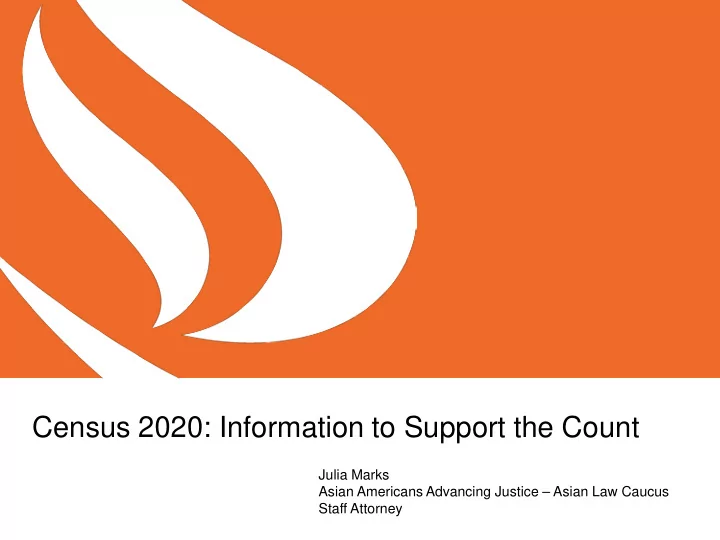

Census 2020: Information to Support the Count Julia Marks Asian Americans Advancing Justice – Asian Law Caucus Staff Attorney
What is the census and why is it important? • Every ten years, the U.S. government counts every person living in the U.S. • Data is used to determine: – Federal funding for local and state programs (health, housing, education) – Representation in Congress – How political districts are drawn
When is the census and how does it work? – The Census Bureau will send invitations to respond to the census in March 2020 • Most households will first get a link and code for the online questionnaire • If a household does not respond, then the Bureau will send a paper form – You can also respond by phone
What does the government ask? – The form asks for basic information about everyone who lives in the household • Name, age, DOB, sex, relationship, race, ethnicity – There might be a question about U.S. citizenship
Will the census ask me whether I am a citizen? • The government is trying to add a question about citizenship to the 2020 census. • There are multiple lawsuits challenging the question. Three judges found the question was unlawfully added. • The Supreme Court is deciding an appeal of the issue. • We won’t know for sure until June 2019.
What does the citizenship question look like?
Will my census information be kept confidential? • Extremely strong data confidentiality protections in federal law (Title 13): – Individual responses cannot be shared with other federal agencies, including immigration enforcement – Data cannot be used for any purpose other than statistical analysis – Wrongful disclosure can lead to a $250,000 fine, up to 5 years prison, or both
Am I legally required to fill out the census? • Yes • Technically, not participating in Census is a crime – Fine of up to $5,000 – Enforcement is unlikely: Last known enforcement action was in 1970
What happens if I don’t respond to the census? • If you do not respond, a census worker will visit your house (up to 6 times) – Worker will have a badge and Census Bureau materials (documents, bag) – Possibly also phone calls to your house
Can I skip the citizenship question? • Law requires complete response • If you decide to skip one or more questions, you will still be counted in the census – Exception: You must provide an address to be counted in the census
What happens if I skip some census questions? • If you do not respond to all of the census questions, it is possible that a census worker will visit your house to get the missing information – The more questions you skip, the likelier it is someone will follow up – If you only skip one or two questions, it is unlikely the Bureau will follow up
What if I lie about whether I am a citizen on the census? • Possible consequences: – Providing a false answer to the census is a crime – Confidentiality protections should prevent immigration enforcement from seeing individual responses • There could be serious immigration consequences if a person is found to have falsely stated they are a citizen
What are risks for nonprofits encouraging non-response? • If a nonprofit is responsible for the conduct of illegal activities, to a substantial degree, 501(c)3 status OR 501(c)4 can be scrutinized by IRS.
What are risks for communities if people skip the citizenship question? Widespread non-response to the citizenship question —by citizens and non- citizens—could make enforcement of voting rights laws more difficult.
What is the Bureau’s language access program for Census 2020? • Online and phone assistance in: – English, Spanish, Chinese, Vietnamese, Korean, Russian, Arabic, Tagalog, Polish, French, Haitian Creole, Portuguese, and Japanese • Paper form in: – English and Spanish • Language Guides in 59 languages
Contact: Julia Marks Asian Americans Advancing Justice – Asian Law Caucus juliam@advancingjustice-alc.org
Recommend
More recommend